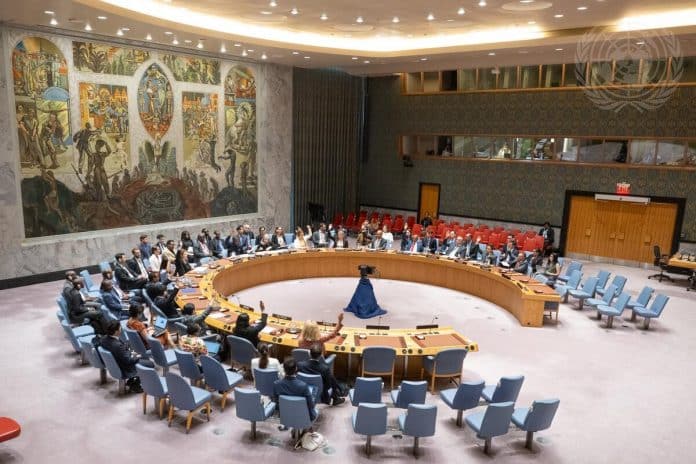NEW YORK – Thank you, Mr. President [His Excellency Mr. Michael Imran Kanu, PR of Sierra Leone], for this opportunity to brief the Council on the humanitarian disaster now unfolding in Sudan.
Excellencies, the World Food Programme, and other humanitarian agencies, have been warning for months now of a widespread collapse in food security across the country.
We have been clear that famine is a real and dangerous possibility: caused by the raging conflict, widespread displacement, and above all the denial of humanitarian access by the warring parties.
In March, WFP briefed Council members following the release of a White Note under Resolution 2417, which signaled that famine was imminent. We warned then that aid agencies were being blocked from accessing significant parts of the country with food and other essential supplies.
But our warnings have not been heard. The Famine Review Committee [FRC] has concluded there is famine in Zamzam camp, near El Fasher, in North Darfur. The FRC is also warning that other areas, in Darfur and elsewhere, are at high risk of famine if urgent action is not taken to provide lifesaving assistance at the required scale.
As you have heard from my OCHA colleague, more than half of Sudan’s population is facing crisis levels of hunger, and the numbers continue to climb. Over 750,000 people are currently classified as being in IPC phase 5 – they are experiencing catastrophic levels of food insecurity. An estimated 730,000 children are projected to suffer severe acute malnutrition this year, the most life-threatening form of malnutrition.
This is the first time the Committee has confirmed a famine for more than seven years, and only the third time since the global monitoring system was launched 20 years ago.
Conditions throughout Sudan are indeed appalling, and getting worse by the day. This forgotten crisis has not received the political and diplomatic attention it desperately needs. Yet it has wider implications and threatens to destabilize the wider region.
Last week’s confirmation of famine must serve as a wake-up call for the international community, and for members of this Council.
There must now be a coordinated diplomatic effort to address the widespread operational challenges, and impediments, that aid agencies are facing everyday, as we try to reach the millions of Sudanese people in abject need.
All parties to this conflict are failing to meet their obligations and commitments under the international humanitarian law. We know that Humanitarian space is shrinking all the time.
Expanded access and new supply lines across borders, and across conflict lines, are vital to enable aid agencies to meet the extraordinary needs that exist today. But the obstacles to securing them are immense.
Both parties to the conflict are routinely blocking requests for cross-line clearances. This is severely restricting the amount of aid getting through and preventing us from operating at scale.
Restrictions imposed on cross-border routes are another major obstacle, preventing agencies from reaching communities in the Darfurs and Kordofans.
The Tine crossing from Chad is open, but the rainy season has significantly reduced delivery capacity, and it is unlikely to be useable for much longer.
It is therefore essential that the Adre crossing is officially made available to aid agencies without further delay. Sustained and predictable flows of humanitarian supplies are crucial to halt the mounting death toll.
Excellencies, despite the huge challenges faced by our teams on the ground, WFP is working day and night to get lifesaving food where it is needed the most.
We are significantly scaling-up operations across the country to curb the spread of famine – boosting our capacity, presence and resources.
We aim to substantially increase the number of people we support. WFP will prioritize reaching people facing emergency and catastrophic levels of hunger – IPC level 4 and 5 – along with those who have been internally displaced.
WFP will also continue supporting refugees who have fled the bloodshed into neighbouring countries, such as Chad, South Sudan and Libya.
We intend to provide a mix of in-kind food assistance, with cash deployed wherever markets are still functioning. We will also procure locally, when feasible, in an effort to support local markets and economies.
Excellencies: humanitarian agencies will do everything we can to prevent famine from engulfing Sudan. But we can only operate where conditions allow, and where we are granted access.
Now more than ever, we need the Security Council to focus on this crisis, and use its influence on the warring parties to halt the conflict that is tearing Sudan apart.
A ceasefire remains the only sustainable solution that will prevent the further spread of famine. Until that day, we urgently need the Council’s help to ensure we can carry out our work effectively, and without interference.
First, we need increase flexible funding to support the rapid scale-up of the relief operation. Sudan is critically underfunded, and this has to change if we are to save lives.
Second, we need effective diplomacy to secure cross-border supply routes via Adre, and other border entry points from Chad, South Sudan, Libya, and Egypt.
Third, we need your assistance to stop routine interference with humanitarian deliveries and movements, including a range of bureaucratic restrictions.
And finally, all parties must uphold their commitments under international humanitarian law, and under Resolution 2417.
Halting the famine now underway requires political will and leadership.
WFP calls on the Security Council to provide it. The people of Sudan, exhausted by war and broken by hunger, deserve no less. We must not let them down.
Thank you.
Per saperne di più, cliccare qui.

